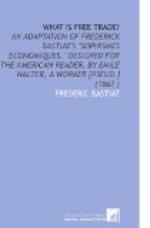Has not Congress passed laws which prohibit the importation of foreign productions by the maintenance of excessive duties? Does not the Tribune maintain that it is advantageous to limit the supply of iron manufactures and cotton fabrics, by restraining any one from bringing them to market, but the manufacturers in New England and Pennsylvania? Do we not hear it complained every day: Our importations are too large; We are buying too much from abroad? Is there not an Association of Ladies, who, though they have not kept their promise, still, promised each other not to wear any clothing which was manufactured in other countries?
Now tariffs can only raise prices by diminishing the quantity of goods offered for sale. Therefore, statesmen, editors, and the public generally, believe that scarcity is better than abundance.
But why is this; why should men be so blind as to maintain that scarcity is better than plenty?
Because they look at price, but forget quantity.
But let us see.
A man becomes rich in proportion to the remunerative nature of his labor; that is to say, in proportion as he sells his produce at a high price. The price of his produce is high in proportion to its scarcity. It is plain, then, that, so far as regards him at least, scarcity enriches him. Applying, in turn, this manner of reasoning to each class of laborers individually, the scarcity theory is deduced from it. To put this theory into practice, and in order to favor each class of labor, an artificial scarcity is produced in every kind of produce by prohibitory tariffs, by restrictive laws, by monopolies, and by other analogous measures.
In the same manner it is observed that when an article is abundant, it brings a small price. The gains of the producer are, of course, less. If this is the case with all produce, all producers are then poor. Abundance, then, ruins society; and as any strong conviction will always seek to force itself into practice, we see the laws of the country struggling to prevent abundance.
Now, what is the defect in this argument? Something tells us that it must be wrong; but where is it wrong? Is it false? No. And yet it is wrong? Yes. But how? It is incomplete.
Man produces in order to consume. He is at once producer and consumer. The argument given above, considers him only under the first point of view. Let us look at him in the second character, and the conclusion will be different. We may say:
The consumer is rich in proportion as he buys at a low price. He buys at a low price in proportion to the abundance of the articles in demand; abundance, then, enriches him. This reasoning, extended to all consumers, must lead to the theory of abundance.
Which theory is right?
Can we hesitate to say? Suppose that by following out the scarcity theory, suppose that through prohibitions and restrictions we were compelled not only to make our own iron, but to grow our own coffee; in short, to obtain everything with difficulty and great outlay of labor. We then take an account of stock and see what our savings are.




